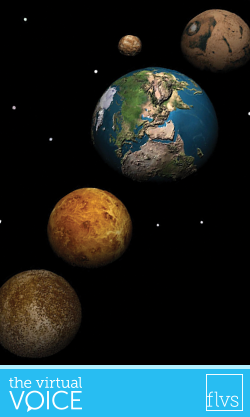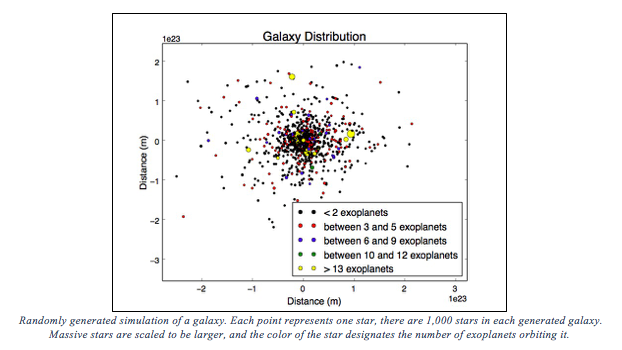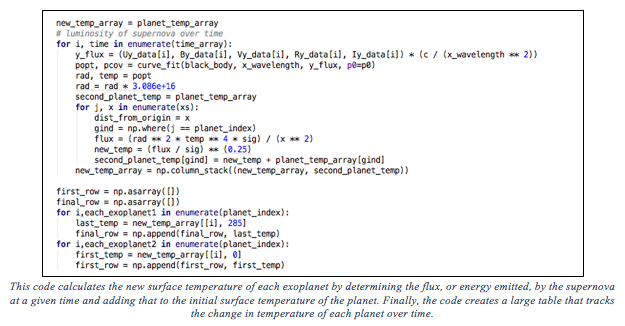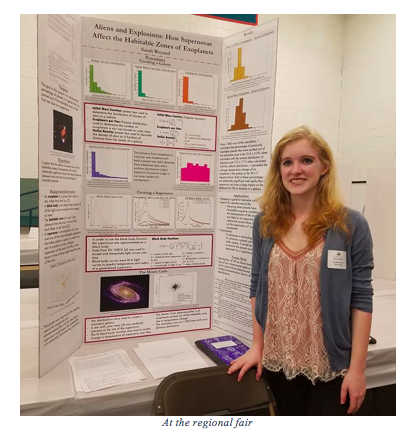Aliens and Explosions
This post was written by FLVS student Sarah Weyand about her award-winning research in astrophysics.
 My science fair journey began about a year ago.
My science fair journey began about a year ago.
I was approached by a Harvard graduate who wanted to mentor a high school senior in an astrophysics and computer science research project.
I knew nothing about astronomy and I didn’t know a single programming language, but I love space and I plan to major in computer science in college. Naturally, I said yes. This project has taken me to the Science Talent Search, the Indian River Regional Science and Engineering Fair, and, now, the State Science Fair.
My project is titled Aliens and Explosions: How Supernovae Affect the Habitable Zones of Exoplanets.
The purpose of the project is to calculate the percentage of exoplanets, a planet that does not orbit our Sun, that would no longer be in the habitable zone of their host star due to a supernova, the explosive death of a massive star.
In simplest terms, I coded a simulation that created a galaxy based on several parameters and measured the surface temperatures of all the exoplanets in the galaxy. Next, a supernova (modeled after real supernova data) would occur in the galaxy, and the new surface temperatures of the exoplanets would be determined, so I could make my comparisons. From 1,000 runs of my simulation, I determined that around 18 percent of exoplanets were pushed out of the habitable zone due to a supernova. Each run of the simulation would create a new galaxy.
Below is a realization of one of the galaxies produced by the code, along with the code that calculates the new surface temperatures of the exoplanets after the supernova.

The code calculates the new surface temperature of each exoplanet by determining the flux, or energy emitted, by the supernova at a given time and adding that to the initial surface temperature of the planet.

The project took around nine months to complete. I couldn’t have done it without the help of my mentor, Ashley Villar. I was also taking Honors Earth-Space Science at FLVS at the time, and the course helped me get a solid foundation on the other aspects of space that I wasn’t studying in my project. I also enjoyed talking to my teacher, Ms. Childs, about what I was working on. She even helped me with a ticket to the Kennedy Space Center so I could learn even more about astronomy. I’m so grateful to Ms. Childs for being so supportive of my project and motivating me to do my best.
I participated in the Indian River Regional Science and Engineering Fair in late February. It was the first science fair I had been in since elementary school. Overall, I had a great experience. I was visited by six judges, all of whom were very interested in the project and gave helpful advice. If you’re reading this as someone who is planning on participating in a science fair, my one piece of advice would be to practice. Practice in front of people who have no idea what your project is about – the questions they ask are the same questions the judges will ask. Nothing made me more relaxed and confident than knowing that I was prepared.

I ended up winning first place in the Physics & Astronomy category in the senior division as well as the Thinking Outside the Box award. I also earned a bid for the State Science Fair. I am so excited to go to states this week and I feel so fortunate to have had the opportunity to do this research project!
To anyone who is looking to do a science fair project – do it!
It is an amazing learning experience that I wouldn’t trade for anything. I know many kids who didn’t get any help from a mentor who are going to states, so if you have an idea, go for it! If you want to do a project with a mentor, talking to a teacher is a great way to start. They often have fellow teachers, associations, or former students who they can connect you to. I was introduced to Ashley through my AP Chemistry teacher who taught her several years ago.
As I said before, FLVS has been so encouraging throughout this project and I am grateful for the opportunity to share my experience in this way. I am thrilled to see what next week holds for me as my science fair journey comes to an end.
A final note, though, to all the girls who love STEM, who want to be computer scientists and engineers and everything in between, who find themselves the only girl in the computer science summer camps and the only girl who does a science fair. If you’re being told you can’t do it, or people don’t take your project seriously because you’re a girl, or you’re considering not majoring in a STEM field because you’re a girl … do it anyways.
Prove them all wrong.
Post by FLVS Student Sarah Weyand
